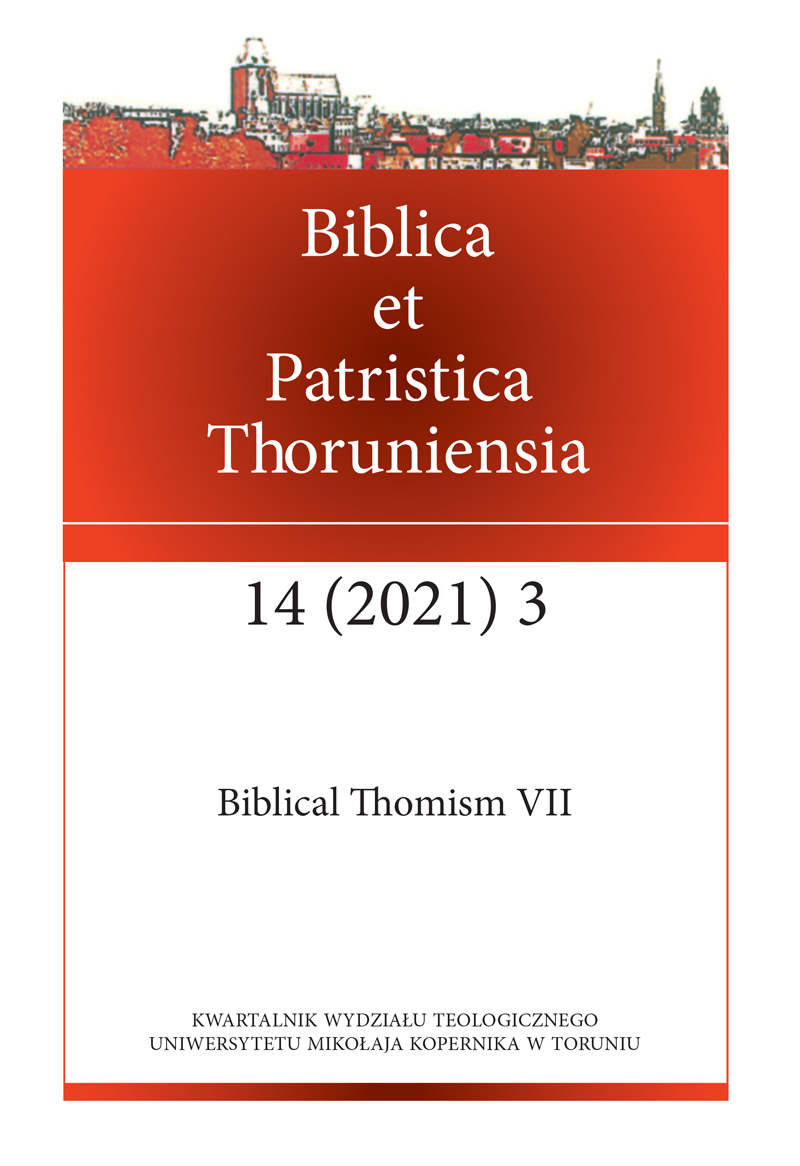Jak myślą prorocy? O procesie zachodzącym w ludzkim umyśle podczas prorokowania
DOI:
https://doi.org/10.12775/BPTh.2021.012Słowa kluczowe
Tomasz z Akwinu, proroctwo, proces poznawczy, proces intelektualnyAbstrakt
Fenomen proroctwa w interpretacji o. José María Arévalo jest procesem współpracy Bożej łaski objawiającej nam prawdę o samym Stwórcy i ludzkiego intelektu, który swymi naturalnymi siłami i zgodą na działanie jest w stanie przyjąć wiedzę o tym, co nadprzyrodzone. Kolumbijski autor ukazuje nam w ten sposób nauczanie Tomasza z Akwinu o proroctwie jako coś, co w interesujący sposób wpisuje się w znane ujęcie Akwinaty odnoszące się do relacji między łaską i naturą: gratia non tollit naturam sed perficit. Jest to bardzo aktualny i potrzebny przekaz w dobie postmodernistycznego kryzysu ludzkiej racjonalności i wiary.
Bibliografia
Alarcón E., Aquinas’ Harmonization of Evangelical Morality and Philosophical Ethics, w: Towards A Biblical Thomism. Thomas Aquinas and the Renewal of Biblical Theology, pod red. P. Roszak i J. Vijgen, Pamplona 2018, s. 153-172.
Arévalo J. M., El padre José María Lagrange, O.P. y el Modernismo, w: J. M. Arévalo, El proceso intelectual de la profecía según Santo Tomás, Bogota 2020, s. 169-175.
Arévalo J. M., El proceso intelectual de la profecía según Santo Tomás, Bogota 2020.
Correa Miranda G., Liminar. Los juicios de Dios en la mente de un profeta, w: J. M. Arévalo, El proceso intelectual de la profecía según Santo Tomás, Bogota 2020, s. 15-88.
Levering M., Scripture and Metaphysics. Aquinas and the Renewal of Trinitarian Theology, Oxford 2004.
Machowski A., La pleamar de las profecías fue rechazada ya en el siglo XIII. La autonomía de lo político en relación con el pensamiento teológico de los textos de Tomás de Aquino sobre la profecía, w: De natura. La naturaleza en la Edad Media, pod red. J. L. Fuertes Herreros i A. Poncela González, Ribeirao 2015, s. 587-595.
Machowski A., “Ut omnes aliquam partem habeant in principatu”. Uczestnictwo obywateli w życiu politycznym wspólnoty w myśli Tomasza z Akwinu, Toruń 2021.
Marcos, A., Perez Marcos, M., Cave 2.0. The dualistic roots of transhumanism, Scientia et Fides 2(2019), s. 23-40, doi:http://dx.doi.org/10.12775/SetF.2019.014.
Merlo, J., Zarathustra and Transhumanism: Man is Something to Be Overcome, Scientia et Fides, 2(2019), s. 41-61, doi:http://dx.doi.org/10.12775/SetF.2019.015.
Mesa Angulo J. G., Prólogo. Un tesoro revelado, w: J. M. Arévalo, El proceso intelectual de la profecía según Santo Tomás, Bogota 2020, s. 7-13.
Mróz M., Virtue Epistemology and Aquinas’s Biblical Commentary on the Corpus Paulinum, w: Reading Sacred Scripture with Thomas Aquinas. Hermeneutical Tools, Theological Questions and New Perspectives, pod red. P. Roszak i J. Vijgen, Turnhout 2015, s. 435-456.
Reading Sacred Scripture with Thomas Aquinas. Hermeneutical Tools, Theological Questions and New Perspectives, pod red. P. Roszak i J. Vijgen, Turnhout 2015.
Roszak P., Biblia i metafizyka: ku tomizmowi biblijnemu, w: Tomasz z Akwinu, Wykład Listu do Kolosan, Super Epistolam B. Pauli ad Colossenses lectura, Toruń 2012, s. 9-21.
Roszak P., Exégesis y metafísica. En torno a la hermenéutica bíblica de Tomás de Aquino, w: Salmanticensis 61 (2014), s. 301-323.
Roszak P., The Place and Function of Biblical Citations in Thomas Aquinas’s Exegesis, w: Reading Sacred Scripture with Thomas Aquinas. Hermeneutical Tools, Theological Questions and New Perspectives, pod red. P. Roszak i J. Vijgen, Turnhout 2015, s. 115-139.
Tomasz z Akwinu, De malo, Questiones disputate, Turyn 1942.
Tomasz z Akwinu, De unitate intellectus contra Averroistas, Rzym 1976.
Tomasz z Akwinu, De veritate, Questiones disputate, Turyn 1942.
Tomasz z Akwinu, In Aristotelis librum De anima comentarium, Turyn 1936.
Tomasz z Akwinu, In Isaiam prophetam expositio, Paryż 1876.
Tomasz z Akwinu, In Evangelium Secundum Joannem, Turyn 1926.
Tomasz z Akwinu, In omnes S. Pauli apostoli Epistolas commentaria, Turyn 1929.
Tomasz z Akwinu, Sentencia libri De sensu et sensato cuius secundus tractatus est De memoria et reminiscencia, Paryż-Rzym 1984.
Tomasz z Akwinu, Summa contra gentiles, Rzym 1934.
Tomasz z Akwinu, Summa Theologica, Paryż 1934.
Tomasz z Akwinu, Wykład Listu do Kolosan, Super Epistolam B. Pauli ad Colossenses lectura, Toruń 2012.
Vijgen J., The use of Aristotle in Aquinas’s biblical commentaries, w: Reading Sacred Scripture with Thomas Aquinas. Hermeneutical Tools, Theological Questions and New Perspectives, pod red. P. Roszak i J. Vijgen, Turnhout 2015, s. 287-346.
Pobrania
Opublikowane
Jak cytować
Numer
Dział
Licencja
Prawa autorskie (c) 2021 Adam Machowski

Utwór dostępny jest na licencji Creative Commons Uznanie autorstwa – Bez utworów zależnych 4.0 Międzynarodowe.
CC BY ND 4.0. Posiadaczem prawa autorskiego (Licencjodawcą) jest Autor, który na mocy umowy licencyjnej udziela nieodpłatnie prawa do eksploatacji dzieła na polach wskazanych w umowie.
- Licencjodawca udziela Licencjobiorcy licencji niewyłącznej na korzystanie z Utworu/przedmiotu prawa pokrewnego w następujących polach eksploatacji: a) utrwalanie Utworu/przedmiotu prawa pokrewnego; b) reprodukowanie (zwielokrotnienie) Utworu/przedmiotu prawa pokrewnego drukiem i techniką cyfrową (e-book, audiobook); c) wprowadzania do obrotu egzemplarzy zwielokrotnionego Utworu/przedmiotu prawa pokrewnego; d) wprowadzenie Utworu/przedmiotu prawa pokrewnego do pamięci komputera; e) rozpowszechnianie utworu w wersji elektronicznej w formule open access na licencji Creative Commons (CC BY-ND 3.0) poprzez platformę cyfrową Wydawnictwa Naukowego UMK oraz repozytorium UMK.
- Korzystanie przez Licencjobiorcę z utrwalonego Utworu ww. polach nie jest ograniczone czasowo ilościowo i terytorialnie.
- Licencjodawca udziela Licencjobiorcy licencji do Utworu/przedmiotu prawa pokrewnego nieodpłatnie na czas nieokreślony
PEŁEN TEKST UMOWY LICENCYJNEJ >>
Statystyki
Liczba wyświetleń i pobrań: 570
Liczba cytowań: 0



